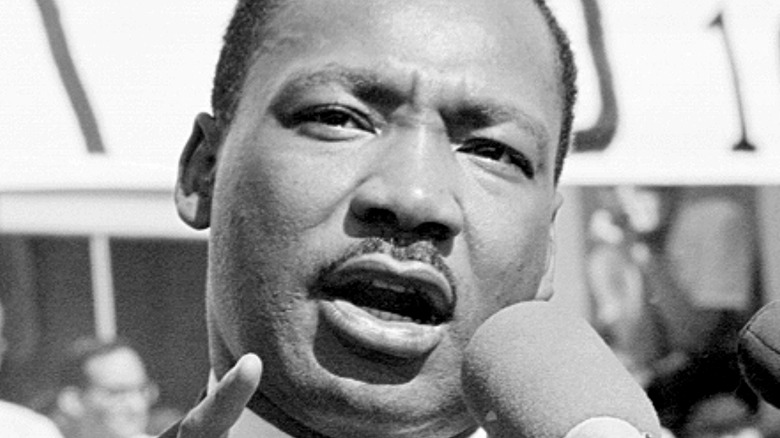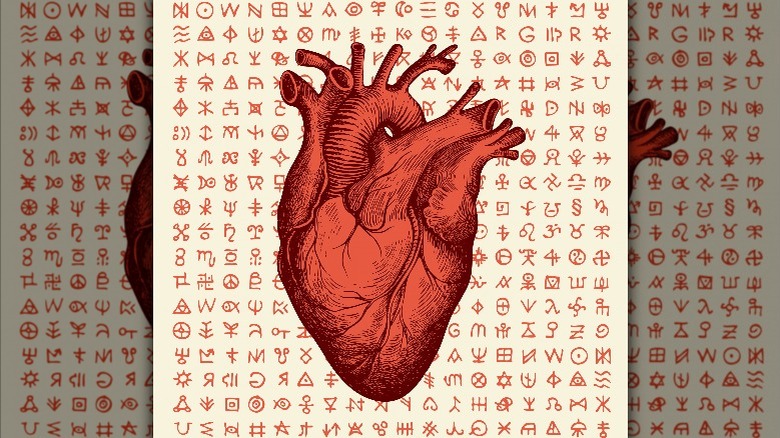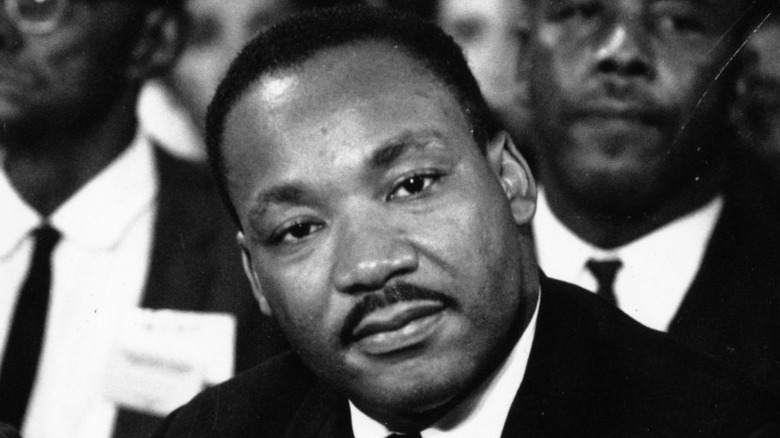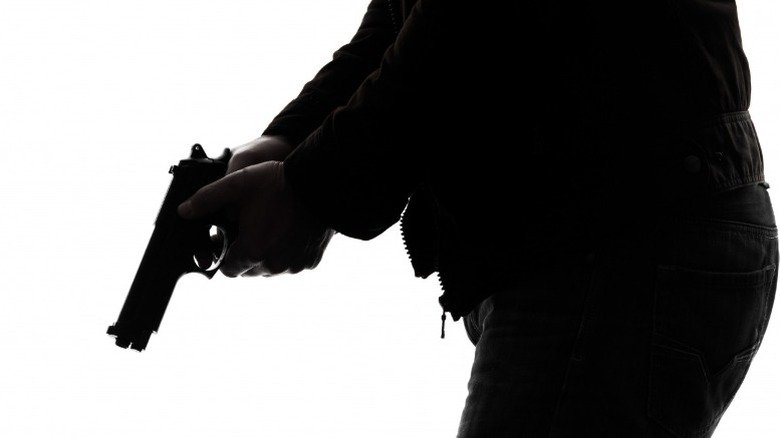The Police Officer's Career That Was Intertwined With Two Of America's Most Famous Figures
The police officers who are sworn to protect us sometimes have brushes with iconic figures in history. From the police on the scene at the assassination of President John F. Kennedy in 1963 to the details that have escorted various visiting royalty to the United States, there are so many officers on so many police forces that have incredible stories about moments in American history.
But what are the odds that one officer would have intimate contact with not one, but two people who would cement themselves in the history books? That was the case with a New York City police officer named Al Howard. Howard was a fairly new officer in 1958 when he was able to help change the course of history by assisting a famous civil rights leader (via The Atlanta Journal-Constitution). His actions prevented the man from dying that day, keeping an important chapter in civil rights history from coming to a tragic and abrupt end. Later in his career, Howard was part of a detective team that helped apprehend a brutal serial murderer that was terrorizing the citizens of New York.
Howard was called to the scene of a disturbance inside a Harlem department store
The Atlanta Journal-Constitution tells of that Saturday afternoon in 1958 when Al Howard and his patrol partner received a call from dispatch about a disturbance erupting at the Blumstein's department store in Harlem. When Howard and the second officer arrived, they were directed to the second floor of the business. There they found Martin Luther King Jr. sitting in a chair with a letter opener plunged into his chest. In front of him were copies of his book "Stride Toward Freedom" that he had been signing for supporters.
A man was restraining a woman nearby. The woman, later identified as Izola Curry, had run up to King and stabbed him. As Howard was working to quickly put the pieces together, a second woman approached the wounded King and tried to pull the weapon out of his chest. Thankfully, Howard and the other officer were able to stop her in time. Believing that removing the letter opener would cause King to lose more blood, he quickly made a call to the Harlem Hospital. A doctor confirmed Howard's suspicions and told him to leave the opener in the victim's chest. An ambulance was dispatched.
Howard and several others picked up the chair King was seated in and carefully took him downstairs to await his ride to the hospital. This was a move that would be partially credited for saving King's life.
King nearly died from the attack
The stab wound inflicted on Martin Luther King was a serious one. The Atlanta Journal-Constitution reports that it took "a team of doctors" to work on the wound. One noted that the blade had "impinged" the aorta. Had it fully punctured, King would have almost instantly died. Surely keeping the letter opener in place kept this from happening, as did stopping the otherwise well-intentioned lady from prematurely removing it. King was confined to the hospital for weeks. but the famed civil rights icon was nursed back to health and returned to his home in Alabama.
It would be difficult to imagine what the next decade would have been like had Izola Curry been successful in her attempt to kill King. There would have been countless monumental moments in civil rights history changed had he died on that day in 1958. Would the Atlanta sit-ins have happened without King? Or the March on Washington in 1963? It's difficult to say. But history does tell us that without the quick-thinking Al Howard, those hard questions would have been tearfully answered.
King forgave his attacker
Martin Luther King's would-be assailant was arrested and charged. Though prosecutors levied a count of attempted murder against her, Izola Curry would never face a jury. After being evaluated at Bellevue Hospital, it was determined that she was severely mentally ill and not competent enough to stand trial. She was remanded to a mental institution, where she was eventually diagnosed as a paranoid schizophrenic (via The King Institute at Stanford University). Afterward, she was committed to the Matteawan State Hospital for the Criminally Insane.
Rather than anger for the near-fatal attempt on his life, King held an approach that was as loving as it was memorable. When he was released from the hospital and returned home to Alabama, he released the following statement (via The King Institute at Stanford University): "I am deeply sorry that a deranged woman should have injured herself in seeking to injure me. I can say, in all sincerity, that I bear no bitterness toward her and I have felt no resentment from the sad moment that the experience occurred. I know that we want her to receive the necessary treatment so that she may become a constructive citizen in an integrated society where a disorganized personality need not become a menace to any man."
Howard was also part of the detective unit that investigated Son of Sam
The late Martin Luther King wasn't Al Howard's only brush with a notable name in American history. But unlike the highly revered civil rights leader, the second high-profile figure that became intertwined with Howard was a notorious serial murderer. For over a year in the late 1970s, the "Son of Sam" killer stalked the streets of New York City. During his killing spree, six lives were taken, all from the barrel of a .44 revolver (via History). In addition to the deaths, seven others were seriously wounded. Police had assembled a special "Omega" unit to investigate and hopefully capture the elusive shooter.
After receiving hundreds of tips on suspects, the Omega was notified that a man fitting the description of the suspect was terrorizing his neighbors. When officers approached the man, David Berkowitz, he admitted that he was the Son of Sam Killer and was on his way to find yet another victim. A police search of Berkowitz turned up a .44 revolver. The work of the Omega was instrumental in solving the Son of Sam murders, and Howard was a part of that elite unit (via The New York Times). Though the circumstances were terrible, Howard's role was a great capstone to a storied career as a New York City cop.
Howard's life after retiring from the police force
Al Howard eventually retired from the police department and began a second career as a club owner. But rather than begin one from the ground up, Howard invested in the Harlem community he loved and purchased one of the cornerstones of its entertainment history. He bought into Showman's, a jazz club that was first established in 1942. The Columbia Daily Spectator points out that the club was in its third location but had hosted a great number of jazz legends throughout its 80-year history.
From Billie Holiday to Eartha Kitt, the stars of the day would often do small sets at Showman's while on break from their acts at the nearby Apollo Theater. Now blocks away at 125th Street and Morningside Avenue, Showman's still features live music three nights a week. The pairing of music with the storied history of both the venue and the man behind it combine for a unique Harlem experience.
Howard continued to run the club until he died in 2020. The New York Times reports that the Harlem hero and icon died while on a trip to Las Vegas that October. The source says that he died from complications from the COVID-19 virus.





